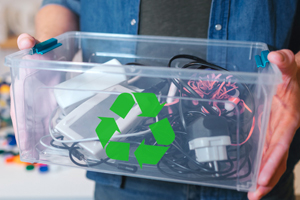
E-waste, the no-longer-functional or obsolete electronic device that’s disposed of, includes electronic equipment and appliances — from toasters and gaming devices, to washing machines and solar panels — and everything in between. E-waste is considered a separate category of refuse in the landfill. It’s different than trash, or the glass, plastics and paper that are processed at recycling facilities.
The e-waste recycling process involves separating out distinct materials and processing each separately. In addition to recyclable plastic and glass, there are often hazardous elements like barium, chromium and lead that require disposal. Often, e-waste contains precious metals like gold, silver, aluminum, nickel and zinc that can be harvested and repurposed.
To dispose of e-waste, contact your municipality or a private electronic waste collector. They will let you know the type and amount of e-waste they’ll take off your hands at any one time, and if there’s a fee involved for any of the items. Also look for e-waste events, often hosted by municipalities and nonprofit organizations, when e-waste is collected at a centralized location.
About This Author

Pete Yang
Pete Yang is a senior vice president for Alpine Bank and the co-chair of Alpine's "Green Team." He's based in Aspen, where he handles commercial and consumer loans, with a particular focus on resort financing. He has a keen interest in protecting Colorado's unmatched mountain environment.
More about Pete Yang

